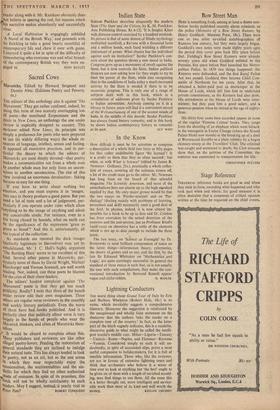Sacred Cows THE editors of this anthology aim it against
'The Movement.' They get rather confused, indeed, by using this term of two scarcely overlapping lots of poets—the moribund Empsonians and the Poets in New Lines, an anthology the one under review is explicitly designed to counter. This reviewer edited New Lines; its principle was simply a preference for poets who were prepared to use (in widely differing- ways) the whole re- sources of language, intellect, senses and feeling. It opposed all restrictive practices, and in par- ticular the theory to which the editors of Mavericks are most deeply devoted—that poetry makes a communication not from a whole man to another whole man but only from an uncon- scious to another unconscious. The rise of this view involved an enormous devaluation : faking became so easy for one thing.
If you have to write about nothing but emotion, and you must express it in 'images, You may in theory produce a good poem. But you need a lot of taste and a lot of judgement, par- ticularly if you operate under rules which allow nothing to be the image of anything and admit any conceivable simile. For instance, even to a fox being chased by hounds, what on earth can be the significance of the expression 'grass as green as blood'? And this is, unfortunately, all too typical of the collection.
As standards are restored the dark images (Perfectly legitimate in themselves) may yet be rehabilitated. Mr. J. C. Hall's highly organised 'The Burning Hare' seems to me excellent of this kind. Several other poems in Mavericks, par- ticularly some of those by David Wright, Michael Hamburger and Vernon Scannell, are well worth reading. Nor, indeed, can these poets be blamed for the cries of their cheer-leaders.
The editors' loudest complaint against 'The Movement' poets is that they get too much Publicity. Really? I note that three of the bunch Under review edit their own magazines. Three Others are regular verse reviewers in the monthly and weekly literary periodicals. Even the worst of them have had books published. And it is Perfectly' clear that publicity about verse is very largely in the hands of people who wear the Maverick blinkers, and often of Mavericks them- selves.
It would be absurd to complain about this. Many publishers and reviewers are like other alleged poetry-lovers. Pending the restoration of general standards they are inclined to indulge their natural taste. This has always tended to look
topoetry, not as an art, but as the one arena which they may respectably enjoy the emotionalism, the sentimentalities and the sin- (brills for which they find no other authorised ...'node of emission. In spite of its promises, this book will not be wholly satisfactory to such readers. May I suggest, instead, a yearly visit to


































 Previous page
Previous page